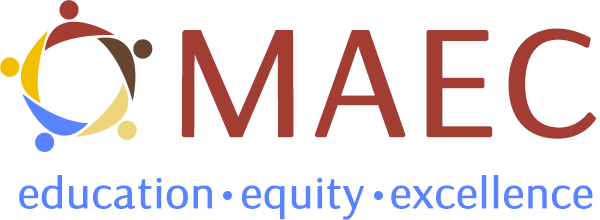MAEC Internship – Ian Rashleigh McNally

Meet Ian Rashleigh McNally, Data and Evaluation Intern! We have been lucky to have a thriving internship program with dedicated, enthusiastic interns who share our passion for education equity. We recently sat down with Ian to learn more about his commitment to education equity and his highlights as an intern at MAEC.
Tell us about yourself!
I was born in upstate New York, raised in Rhode Island, and attended undergrad at Bates College, where I studied bird behavior and ecology as a biology major. During and after college, I worked in outdoor education as a sailing instructor and then a ski instructor. I have fond memories of teaching children between the ages of 2 and 4 years old, who spoke Spanish as their first language, how to ski. I learned many things, among them: knowing how to talk about Disney princesses in Spanish is a vital tool, and there are so many transcultural practices to help kids feel comfortable that have nothing to do with language. After my experiences as an outdoor educator, I worked for an environmental political campaign in Maine as a canvasser and field organizer.
Why do you choose to work in education equity?
It’s funny to talk about my background in biology, outdoor education, and environmental politics and then jump to my work with MAEC – but it’s all connected. In undergraduate, I learned data and analysis skills; as an outdoor educator, I practiced becoming aware of the people and spaces around me; and as a field organizer, I learned how to shift from mobilizing to acting. All of these skills show up in my work in education equity.
My work at MAEC started out in a part-time role with a handful of small projects but quickly expanded in depth and focus. As I got to know MAEC better, I strongly identified with the mission of providing high-quality education to culturally and linguistically diverse learners, and working with MAEC felt like a real opportunity to make meaningful systemic change. I found that MAEC’s approach to equity audits from both qualitative and quantitative angles clarifies what is happening under the surface. Growing up as a white person in a predominately white school district, I remember my district ignoring issues related to race and drowning out the voices of Black and Brown students who were having difficult experiences. As a Data & Evaluation Intern, I can hear those voices reflected in the data, and it’s our job to amplify stories that might have otherwise been drowned out.
What does education equity mean to you?
So many of my colleagues have shared great personal definitions of what educational equity means to them. Building on Kailanya’s definition shared in her #MeetMAECMonday post, education equity is about understanding that each data point that we work with is a person with nuanced experiences, identities, needs, and stories. As evaluators working in education equity, we have a unique responsibility to recognize the humanity in data points and tell a compelling story that has the power to make systemic change for underserved populations.
What do you do as an intern at MAEC?
Because most assignments I support take approximately two to four weeks to complete, my work changes on a regular basis – which is really fun. While at MAEC, I have assisted with database management, conducted research for needs assessments, analyzed focus group data, written for grant proposals, led tech support for webinars, among other things! I’ve also been lucky enough to meet and work with some incredible practitioners who are doing amazing work across the country. It’s all over the place in a good way!
What has been a highlight of your experience at MAEC so far?
The learning environment at MAEC is definitely a highlight for me. To borrow from one of our focus group norms, I deeply appreciate having the opportunity to lean in and lean back. Especially since I come from a background that is not specific to education equity, it is an absolute thrill to learn from amazingly competent, funny, and kind staff. They trust my opinion and want to hear from me, and share the opportunity to lean back and learn. MAEC has provided a really conducive environment to grow.
How do you see this internship factoring into your work after MAEC?
This internship has transformed my perception of what data is and how I interact with it. When most analysts look at a single data point, they don’t see a lot of power or meaning in the individual. When we focus on the collective, we lose that sense of responsibility to an individual person. Recognizing that responsibility adds weight to our work. It also pushes me to challenge the limitations of a single snapshot and to think about the stories that have (and haven’t) been told by the field of education data.
I have learned about so many issues and approaches in education, especially related to what’s going on in classrooms and how to create a space that is welcoming to all students. It’s pushed me to reconsider classroom teaching!

